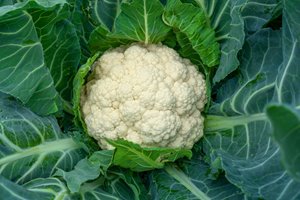
Growing cauliflowers could be the perfect new gardening project for you. Although this crop has a reputation for being a little challenging to grow, with the right conditions and care, they can still be a good choice for home growers.
Cauliflowers are part of the cabbage family and work well in roast dinners, curries and other tasty dishes. There are summer, autumn and winter varieties and plenty of types to choose from in addition to the traditional white or cream ones. Try a purple, orange or green cauliflower to add extra vibrance to your garden and home-cooked meals.
If you want to learn how to grow cauliflowers, here's what you need to know.
When to grow cauliflowers
- Sowing: February to May, October to December
- Planting: Place seedlings in the ground between March and August
- Harvesting: Harvest around three to six months after sowing
How to grow cauliflower plants
Preparing
Preparation is everything when it comes to cauliflower. Start by picking up high-quality seeds from your local garden centre or a reputable online retailer.
Prepare the ground by choosing a spot that gets lots of full sun throughout the day and with fertile soil that's deep and moist, then dig in well-rotted manure. Rake in some high-potassium fertiliser as well for a nutrient boost. Don't forget to remove weeds so they don't steal the water and light from your crops.
Sowing
You can sow your seeds indoors in winter or early spring, or from October if you want to overwinter them for an earlier harvest. Simply fill trays with multi-purpose compost and sow the seeds 2cm deep in each unit. Once the signs of frost have passed, slowly acclimatise them to the outdoors.
Alternatively, sow them directly into the ground in mid or late spring. All you need to do is pop your seeds 2cm into your well-prepared site and ensure each seed has enough space to grow.
Planting
After you've acclimatised your seedlings to the outdoors, make sure your soil is moist before transplanting them. Plant them deep in the ground and leave around 60-75cm between each cauliflower. Water well and firm the surrounding soil.
Caring
This crop loves to be hydrated, without being waterlogged. Cauliflower heads may not form properly if the plants do not get the water they need, so aim for consistently moist conditions and water more frequently during hot, dry spells. Give the crop a high nitrogen feeder after the cauliflower is established for an additional boost.
Cauliflowers are prone to several growing problems. Pigeons and white butterfly caterpillars are common pests, but mesh netting can easily deter them. You can also string up old CDs as a DIY hack that keeps the birds at bay.
Clubroot is another issue to keep an eye out for. Swollen roots or poor growth are signs of this. Preventative measures are the best form of defence - raising the pH of the soil or improving drainage can help, in addition to controlling the spread of contaminated soil on tools and footwear.
When is cauliflower harvested?
Cauliflowers will be ready for harvesting between three and six months from the date sown. Harvest them when their head is firm and hasn't turned yellow. Each variety reaches different sizes, so refer to your seed packet to see what size you're aiming for.
Once it's ready, grab a knife, cut the stem and pull up the head with a handful of leaves beneath it. Carry it to your sink or outdoor tap and wash it with fresh water to remove dirt or insects. You can eat it right away or store it in the fridge. Try to finish the cauliflower in a few days or freeze the florets if you won't eat them in time.
Buy a polytunnel today to make growing cauliflowers easier
If cauliflowers are your next vegetable project, consider getting a polytunnel to make your life easier. They help keep pests away, protect crops from the elements, and the more controlled conditions, such as being able to quickly and easily add shade, can help to avoid fluctuating temperatures. We have plenty of
polytunnel sizes and other
accessories to boost your growing game further.
Need some advice? We're always happy to help. Get in touch by calling
01282 811250, requesting a
call back or emailing
info@premierpolytunnels.co.uk.
For any additional inspiration, read our
growing guides.